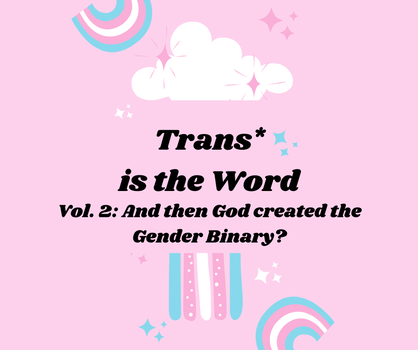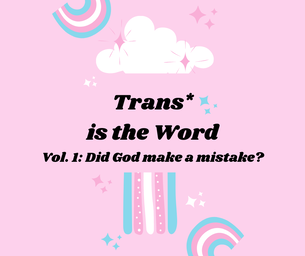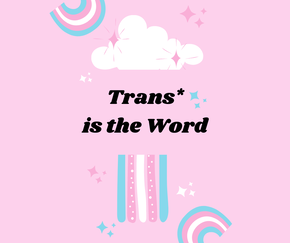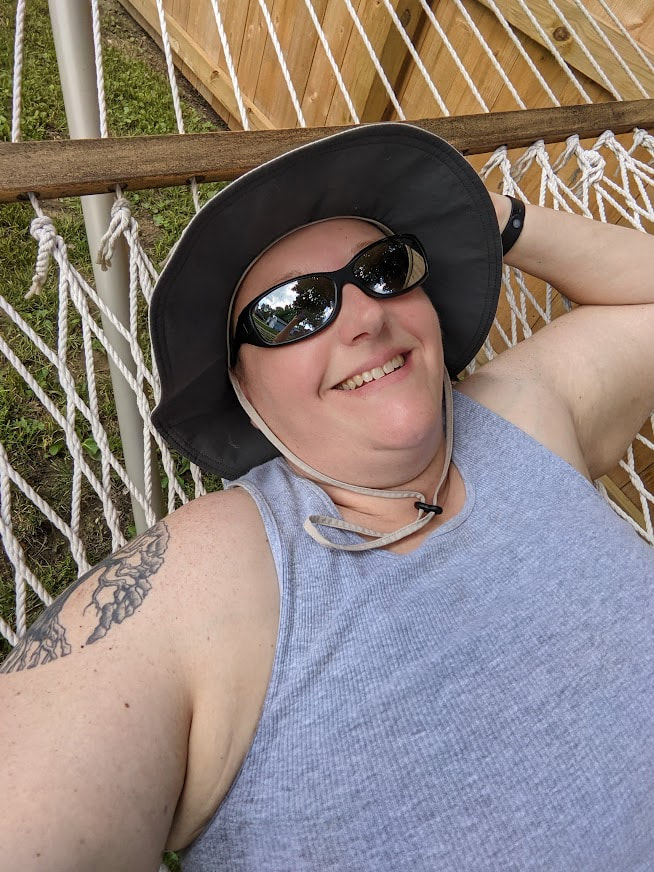 One of the places in scripture that people often turn to in order support the concept of two genders is the first chapter of the book of Genesis, particularly verses 26-27. I'll even save you the trouble of looking it up: Then God said, ‘Let us make humankind in our image, according to our likeness; and let them have dominion over the fish of the sea, and over the birds of the air, and over the cattle, and over all the wild animals of the earth, and over every creeping thing that creeps upon the earth.’ So God created humankind in his image, in the image of God he created them; male and female he created them. This might seem pretty straightforward. I mean, there it is in black and white: Male and female God created them. But these verses don't exist in isolation. They are part of a larger creation story found in Genesis 1 filled with symmetrical pairs of separation: Light and dark, land and sky, day and night, land and sea. The pairs continue with vegetation and animals. Animals of the land and air. Plants that bear fruit and plants that bear seed. But these pairs are in no way meant as limitations to creation. United Methodist deacon, M Barclay (who identifies as nonbinary), puts it this way: “This chapter talks about night and day and land and water, but we have dusk and we have marshes. These verses don’t mean ‘there’s only land and water, and there’s nowhere where these two meet.’ These binaries aren’t meant to speak to all of reality—they invite us into thinking about everything between and beyond.” I think we can all agree that some of the most beautiful things in our lives are between and beyond the simplistic, orderly binary pairs found in Genesis 1. Can you imagine your life without the palate of a sunset, or without the hope that a sunrise brings? Can you imagine wanting to go for a swim in the ocean and having to jump off a cliff to do it because there were no beaches from which one could gently wade from land to sea? I can't and don't want to...do you? But does loving these things "beyond and in between" go against the spirit of this text? My answer to that is simply: BY NO MEANS. Theologian Austen Hartke explains, "Just as we call God the Alpha and the Omega, implying all things from first to last and in between, the author of Genesis 1 is using a poetic device to corral the infinite diversity of creation into categories we can easily understand." In other words, the structure of Genesis 1 was used to capture the vastness of God's beautifully diverse creation beyond our limited understanding. It was NEVER meant to fit God's beautifully diverse creation into our limited understanding. Certainly, if we can agree that estuaries, coral reefs, and marshes are beautiful, intentional fabrics woven into the tapestry of God's creation, could we not also agree that so too are the human beings--the very images of God--in between and beyond the binary referenced in Genesis 1? I can. I do. And I invite you to consider it as well. Until next week. Pr. Melissa  "Are you saying that God made a mistake?" This is a common question many trans* and nonbinary people are faced with--either directly in candid conversation or, more usually, in larger cultural, political, and religious conversations about them, but rarely with them. Either way, the answer is the same: "No." Since I am a cisgender female, it would be inappropriate for me to speak for trans* and nonbinary people. So I ask you to consider the words of transgender theologian and author, Austen Hartke, when he writes, “I believe God made all of me—gender identity included—and intended for me to be a transgender person who sees the world through a different lens. I don’t think God made a mistake. I think God made me transgender on purpose.” While I cannot speak for trans* and nonbinary people as a cisgender female, as a pastor, I do have something to say about Austen's theological assertion: I agree with it. Throughout creation we see examples of species that were created to change form. For example, caterpillars change into butterflies. Tadpoles change into frogs. Moths, flies, ants, wasps, and beetles--all change forms, and how they are created--as larvae--look nothing like their adult forms. We see this in plants as well. According to Garden Drum magazine, "It’s not an unknown phenomenon for trees to change sex – some conifers do it and ash trees are notorious for switching. The plant’s hormones are altered by environmental factors, or perhaps age. Botanists at the University of Tuscia in Viterbo, Italy have recorded instances of female yew trees changing to male, and noted that female yew trees are more prone to suffer stress." All of these examples are not an indication of God's mistakes. They are, I think, a testimony to God's consistency throughout creation. Across species, God's creation has always included those created to change--and not just in small ways, but in BIG, beautiful ways. Certainly such beauty and intention would include we human beings. I know, I know what you're probably thinking: "But doesn't the Bible say that "God created male and female?" Tune in next week when we tackle this question as our "Trans* is the Word" series continues. Until then, Pr. Melissa  Over 50%. The words cut like a knife. Over 50% of Iowans support bans on gender-affirming care for kids and LGBTQ teaching limits in schools. Over 50%. For those of you good with fractions, that means over half of the people I, and so many other LGBTQ+ Iowans share geography with support these bans. Now I know that by the numbers, there are more registered Republicans in the state than there are registered Democrats. There are also a huge number of people in the state (more than those registered with a particular party) who are unaffiliated with any party. Which means that these issues are more than just "party line" issues. Which, in some ways I think, might make this harder to wrap my head around. But in other ways, it's easy to understand. Because even if people aren't aligned with one party or another, and even if they aren't aligned with one particular faith background or another, people are a part of the current culture. And the current culture is full of people who vote on issues rather along party lines, as well as people who are "culturally Christian;" those brought up in the church or around Christianity, whose faith now is more social than spiritual. These same folks tend to lift out and keep certain pieces of their faith and scripture while having no trouble leaving others behind. Which means that this "over 50%" of our neighbors and friends might be people who can't reconcile what they know about faith and God and creation with the existence of trans* people. Maybe some of you who don't necessarily identify as "culturally Christian" might also be struggling to reconcile your faith and what you know of God and creation with the existence of trans* people. If so, then I want to help you and others get a better understanding. Over the next few weeks I will be addressing common issues related to God, faith, creation, and the trans* experience in a series I am calling "Trans* is the Word." I pray you will come to each blog post with an open mind and heart, and that somehow, in sharing these posts with you, you'll come to share them with others too. Perhaps this is the way we move from "over 50%" to under it. Trans* is the Word these days, dear siblings. Let's at least talk about it. Pr. Melissa |
Rev. Melissa Sternhagen
Rev. Melissa Sternhagen was called as the pastor of St. Paul Congregational UCC in June of 2020. Prior to her call to St. Paul, Pr. Melissa worked as a hospice chaplain in the Ames, IA area, following pastorates at rural churches in Central Iowa and Southern Illinois. Pr. Melissa is a second-career pastor with a background in agribusiness and production & supply operations. She received her M.Div. from Eden Theological Seminary in St. Louis, MO, and holds a MA Ed. in Adult Education and Training, and a BA in Organizational Communications. Archives
July 2024
Categories |

 RSS Feed
RSS Feed
